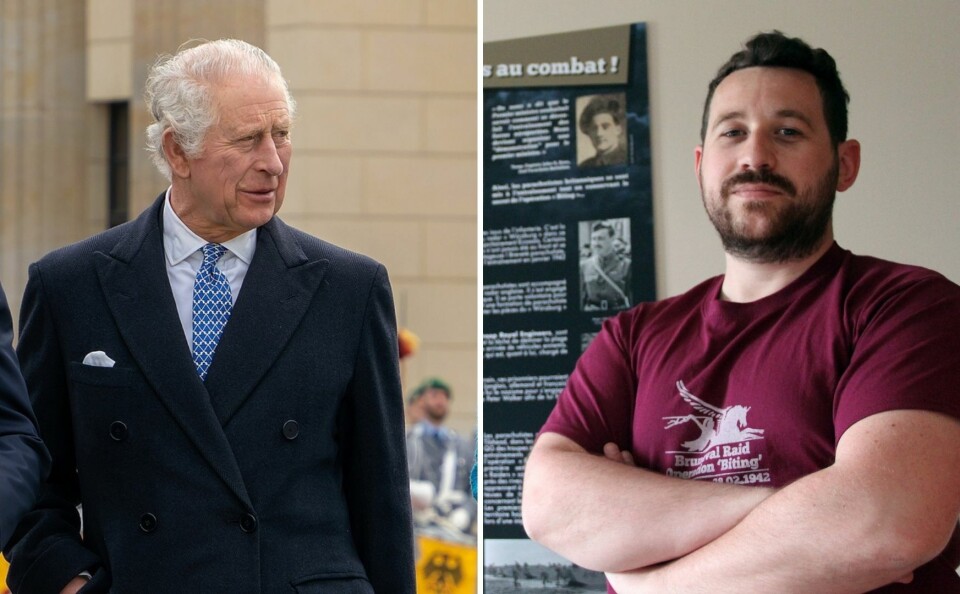-
D-Day silhouettes overlooking the British Normandy Memorial return for a second year
‘I don’t think anyone could walk through without getting a real sense of respect for the soldiers who died here’
-
Please send 100th birthday message to this Canadian D-Day veteran
Plea comes from a Normandy association. The soldier was awarded with France’s highest order of merit, the Légion d'honneur
-
Know your cheeses and their seasons: which to eat in France in February
Cow’s milk cheeses dominate as winter comes to an end
King Charles honours French amateur historian’s work on WWII raid
The Frenchman will receive an honorary British Empire Medal for research on Operation Biting involving 120 British paratroopers

World War Two might be slipping out of living memory, but a French amateur historian’s determination to shed light on one event in the conflict has been rewarded by King Charles.
Honour came out of the blue
Nicolas Bucourt, 38, is among the 2024 recipients of an honorary British Empire Medal for his efforts to shed light on the Bruneval raid, known by British forces as Operation Biting, in Normandy in 1942.
The royal honour came out of the blue.
Mr Bucourt, president of the Association Bruneval Raid: Operation Biting, said: “The UK’s deputy ambassador for France told me that His Majesty King Charles III would like to award me the British Empire Medal for services rendered during the commemorations of the Bruneval raid.”
Read more: MBE awarded to British woman who trained WW2 spies for French missions
Bruneval raid saw around 120 British troops parachuted in
Mr Bucourt has been passionate about the little-known World War Two event since his interest was piqued as a child, growing up in Heuqueville, just outside Bruneval.
“I played in the fields, near the meadows, the cliffs, the beaches and then the German blockhouses.
“So you realise that the Second World War wasn’t that long ago, that you were rubbing shoulders with old-timers who were themselves witnesses to these events,” he said.
“Then there was the Bruneval raid monument, which at the time had no explanation. I wanted to find out more because I thought it was a huge thing that had happened where I grew up.”
The daring Bruneval raid saw around 120 British troops parachuted in to seize parts of a new German radar, located near Bruneval beach, study how it had been made, and find a way of jamming it.
The method they used involved dropping thousands of aluminium strips, and it was deployed again for the Normandy landings.
Read more: US veteran and social media star, 100, in France for D-Day anniversary
Strange coincidences kept him going
There was not much information for Mr Bucourt to go on, but several meetings over the years have kept him going.
They included Alain Millet, who had been researching the raid since the 1970s. The pair published a book online in 2012.
Other strangely coincidental encounters have happened.
Once, when his car had broken down, Mr Bucourt bumped into a nephew of one of the paratroopers hiking through Arnhem. And on a trip to Canada, he stayed 30 minutes from where the niece of another veteran lived.
“I say to myself that there really is a bit of a helping hand here that is encouraging me to keep going,” Mr Bucourt said.
Finally find out how King Charles knew about his work
The British Empire Medal brings him even closer to the men he is trying to honour.
“I didn’t think that, as a Frenchman, I could receive it. I was particularly touched because one of the paratroopers in the Bruneval raid was granted it before the raid.
“Sergeant Luckner got it for an act of bravery. I feel really privileged.”
When he receives his honour later this year, perhaps Mr Bucourt will finally get to the bottom of how King Charles found out about his work.
“That’s a big question. When the deputy ambassador told me, I was a bit disorientated. I didn’t think to ask him how they got wind of it.”
For the moment, he is looking forward to the medal ceremony and hoping the interest it has sparked will enable more people to learn about the Bruneval raid.
“One day, I would really like to be able to have a museum dedicated to these veterans, filled with objects from the raid, their uniforms and their history, just as I’ve been doing with temporary exhibitions for over 10 years now,” he said.
Related articles
Row after association makes Normandy war bunker look like a house
Last of Churchill’s female ‘special spies’ who worked in France dies
American returns 68 years on to French town that helped him after WWII
























